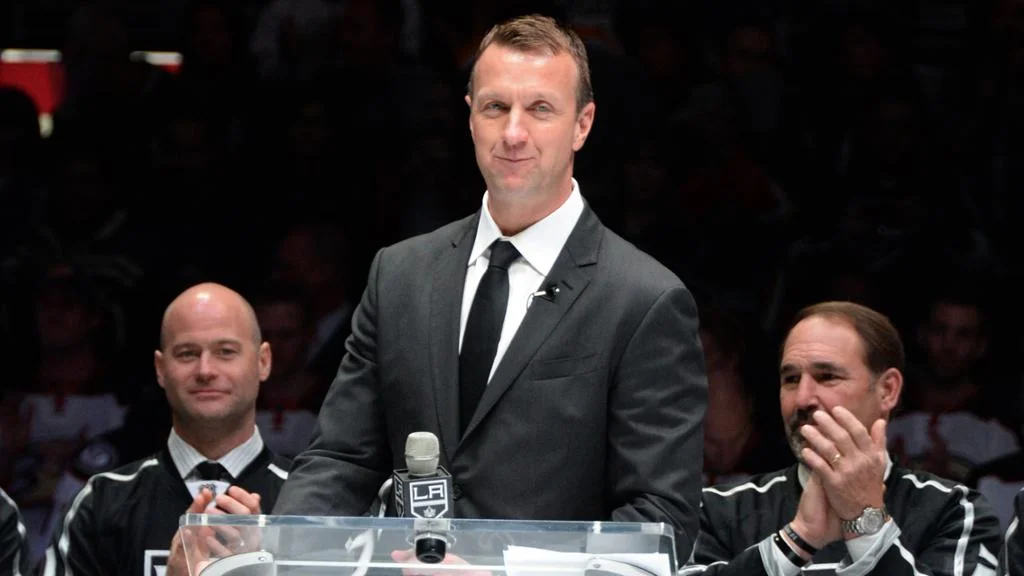June 5, 2019 | 10:00am ET
BY Dennis Bernstein, The Fourth Period
THE PROBLEM WITH THE PLAN
“Everyone has a plan ‘till they get punched in the mouth.” – Mike Tyson
LOS ANGELES, CA – When we last left the Los Angeles Kings, they were just wrapping up the installation of Todd McLellan as head coach to lead them out of their basement standing in the Pacific Division, a product of a demoralizing 71-point season. As long and painful as the regular-season was, the journey to find their new bench boss was short and sweet. Just 10 days after the clock hit triple zeroes in Game 82 against the Vegas Golden Knights General Manager Rob Blake had his man, Todd McLellan inked to a five-year deal.
I was a fan of McLellan when he was in San Jose where he proved he could manage star talent after an apprenticeship with Mike Babcock in Detroit and that was furthered when he was the only coach to figure out the puzzle that is the Edmonton Oilers to the extent of getting them to the second round of the 2016-17 post-season, the only man to do so over the past decade.
If you believe the adage, “addition by subtraction,” the departure of Willie Desjardins (who properly returned to junior hockey, the level he is best suited for) automatically makes Los Angeles better on Opening Night 2019.
It’s been documented Desjardins lost the Kings’ room rapidly after replacing John Stevens after 13 games and it’s a major reason why there are so many questions about this team as Blake’s off-season work commences. I believe that McLellan’s presence will solve multiple issues – credibility between players and coaching staff, l’affair du Kovalchuk and poor seasons from the likes of Drew Doughty and Tyler Toffoli are top of mind.
Is McLellan the perfect coach? No one is, and his detractors among Kings’ fans will remind you he was on the other side of their team’s historic reverse sweep on the way to the 2014 Stanley Cup championship. The fans in Edmonton will tell you their Oilers were poor defensively during his tenure. Still others will throw in the word “retread” and while those criticisms are fair, the legitimacy of this coach is unquestioned.
Does anyone really know what bonds a team and coach to create the framework of a championship contender?
If you think you do, then you must be the one who predicted in November that Craig Berube would lift the St. Louis Blues to within a few wins of capturing the franchise’s first Stanley Cup.
Coaching, like management is both art and science – you need a plan to succeed and then find the path to execute it. Given little chance to elevate a team which on paper was a contender for the Central Division at the start of the season title, but plummeted to last place in the league Berube, more than three seasons removed from a head coaching job galvanized his team, got buy-in and commitment (and along the way found his goalie, Jordan Binnington) in-season to achieve heights very few thought possible.
While I am not suggesting McLellan will elevate the Kings to contender status in the 2019-20 season, I believe when given the horses he is capable of doing it.
And that’s the big question and the point of this column: where, when and how does Blake give McLellan a full stable?
In a season that started with thoughts of back-to-back playoff appearances for the Blake-Luc Robitaille regime and concluded with the second-worst record in the league, the script flipped when it was apparent that the tailspin could not be stopped.
As the Trade Deadline approached, the quiet, private messaging from the executive suite was the youth would be served – the importing of talent would be limited to players 25 years of age and under to get the roster younger and faster. I suspect Blake’s long-term vision from the start was to flip the roster, but he believed he could squeeze one more post-season run out of the current core. That mindset would explain the Ilya Kovalchuk acquisition – the Russian sniper started off strong with Stevens but injury and disharmony with Desjardins placed him far short of the 25 to 30 goal plateau expected of him. The Jake Muzzin trade stands to be a winner and aligned with the plan of serving youth.
So, there was no reason to think Los Angeles was straying from the plan of short-term pain for long term gain until the past week when the rumour surfaced last week that a dialogue with the Maple Leafs had occurred regarding Patrick Marleau.
Yes, that Patrick Marleau – who will be 40 at the start of next season and with the $6.25 million cap hit in the final season of his three-year deal. While some reason that bringing Marleau to Los Angeles would serve the dual purpose of bridging the gap as the transition commenced and extract another asset from Toronto, the fact that a discussion of such nature took place signals that there may be a difference of opinion in the executive suite on how to execute the plan.
A singular conversation about one veteran player does not signal a shift in thinking or disagreement in leadership, but the additional and renewed chatter I’ve heard about Los Angeles being a player for soon-to-be-free agent Artemi Panarin in combination with the Marleau news is at minimum a yellow flag.
It is speculation? Sure is.
Does it make sense? Sure does.
Can the Kings rebuild/retool by being a player for Artemi Panarin? Sure can.
What happened along the path to the youth movement? Why a swerve so soon? Are they off that track?
The answer is yes... and no.
The defining moment may have been on the evening of April 9, the night where the bounce of a few ping pong balls may have re-casted the destiny of the current Kings regime.
Los Angeles entered the Draft Lottery hoping for the first-overall pick, expecting the second and wound up with the fifth pick (thankfully that was as far as they could fall). Instead of getting the generational talent they craved in Jack Hughes (clearly their first choice) or Kaapo Kakko, their top-of-the draft destiny lies in the choices other teams make. The stunned look on Robitaille’s face during the televised event said it all, a look that relates to the quote at the top of this column.
There is no doubt the Kings will get a very good player at minimum, perhaps an excellent one down the line – we’re told the Kings are high on Saskatoon centre Kirby Dach – but what they won’t get is immediate help. And that’s the crux of the issue and where there may be a difference of opinion on the move forward; I believe the commitment to youth included the addition of Hughes or Kappo at the top of the food chain.
The Plan Needed The Man. And still needs one.
The “difficult days ahead” that Blake spoke of during the McLellan introduction would have been an easier sell – to ownership and the ticket-buying public with a crown jewel at the top. Dylan Cozens, Bowen Bynum and Dach may develop into a vital cog of the next Kings championship roster, but none of them have the star power and elite skills of Hughes and Kakko. Regardless of whom the Kings select with the fifth-overall pick, the road back to contention stands to be slowed.
Unless... you get an elite talent as Free Agency Frenzy opens on July 1.
Panarin is a bankable talent who will need a good portion of the Kings bank, but placing him at the top of the rebuild plan can keep the plan on track. He is not an aging superstar; he turns 28 on October 30 and adding him to the mix in addition to McLellan probably adds double digits to the team’s point total next season. He is the type of player that brings fans out of their seats and hopefully there will be more fans in those seats as the ticket sales team would have him to sell as they pitch tickets this summer. I believe some in the organization with influence believe hunting big game is the better route and alignment on strategy may not be in place.
No question the sizable financial commitment will require a balancing act by team capologist Jeff Solomon, but it lessens the pressure on Blake to find a landing home for Jeff Carter, whose trade value cratered during a disengaged season that makes him very difficult to deal even with a reasonable $5.23 million cap hit for the next three seasons.
Some Bread in the lineup could also have him come off his trade deadline ask of a first-round pick for Tyler Toffoli, who at this point is likely to play through his walk season without a contract extension. Maybe Blake goes to the Draft Table in Vancouver and accepts the best offer for Jonathan Quick and moves on. These opinions will be proven out soon enough as within the next 30 days the strategy will be clear.
As for the overall mission to get the roster younger and faster, the fact that the two Stanley Cup finalists have the approximate average roster age as Los Angeles (compare/contrast the Bruins and Blues ages through Cap Friendly and you’ll be surprised) also raises the question of how much youth is needed for a championship cocktail. Brad Marchand and Patrick Bergeron (both in their early 30’s) don’t look to be too old, the Blues key performers are primarily in their late 20’s – what really needs to be done is to get better players in Los Angeles and make smart decisions to acquire them, the biggest gap of all is not speed or age but skill and management should be looking at all options to achieve that end.
Dennis Bernstein is the Senior Writer for The Fourth Period.
Follow him on Twitter.
Past Columns:
Apr. 03, 2019 - Before he bids us adieu, much ado about Drew
Mar. 21, 2019 - 72 and Cloudy in Los Angeles
Feb. 21, 2019 - Kings of the Deadline



